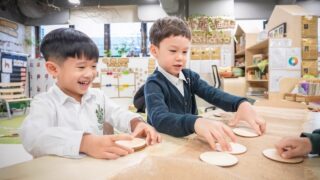What jobs of the future will our children compete for? It’s hard to imagine the skills they’ll need to master for a future we know little about. In 2020, the World Economic Forum published five important notes about the job market of tomorrow. It’s an interesting spread that covers a few points that might not come as a surprise – for example, tech skills will continue to be in high demand – along with a few that might. Among the latter is the notion that human-centric skills, especially those known as ‘soft skills’, will be increasingly in demand.
It feels counter-intuitive that, as machines continue to rise in our workplaces, soft skills – things like creativity and collaboration – will become more appealing, or even more essential. But it’s true. In fact, the World Economic Forum states, “HR professionals are identifying the demand for soft skills as the most important trend globally.” Why? Because they’re almost impossible to successfully automate.
Whole child development in schools
With this in mind, the concept of whole child development has never been so crucial. Most parents are already convinced of the importance of STEM or STEAM. But what of these all-important soft skills – are they on parents’ radars? If so, are they on the radars of schools? If these skills will be such an important differentiator for securing a job in the future, how are schools preparing students?
At Stamford American School Hong Kong (SASHK), the team has devised the Second Step programme to answer this need. It’s a programme that promotes skills for learning, empathy, emotion management and conflict management.
Mia Nortje is the school’s counsellor. She says, “Second Step is a curriculum that we are implementing to help with social and emotional development – teaching children those skills that they need. So, they learn how to identify emotions, how to know what they’re feeling, how to be able to project what they are feeling, how to solve problems, how to get themselves ready for learning, and how to prevent themselves from being bullied and to prevent other children from being bullied.” The programme is taught by the classroom teacher and delivered through a range of specially-created content that includes videos, games, posters and more.

The power of the arts
The arts provide the perfect stage for these in-demand skills of creativity and collaboration to shine. SASHK hosts two full-scale theatre productions each year. Not only are these productions great entertainment for the school’s student and parent body, they’re also a life-changing opportunity for personal development for the students.
Candy is in Grade 7 at SASHK. She was faced with a language challenge when joining the school. However, her language acquisition was accelerated thanks to the school’s theatre production. Tina Batchelder-Schwab, Head of Arts at SASHK, points out, “One of the things that productions do for children like Candy is that they allow them to ease into a role or responsibility where they’re a part of a team, wherever they are in their development.”
Watch Candy’s transformation story in the video below.
If you’re interested in learning more about how SASHK is helping students prepare for the jobs of the future, contact the school directly.
Stamford American School Hong Kong is at 25 Man Fuk Road, Ho Man Tin.
2500 8688 | sais.edu.hk
Are you an expat parent? Check out our Kids section for more advice!
Listen to our podcast: Schools in Hong Kong
Expat guide to international schools in Hong Kong
Top things to do in Hong Kong





